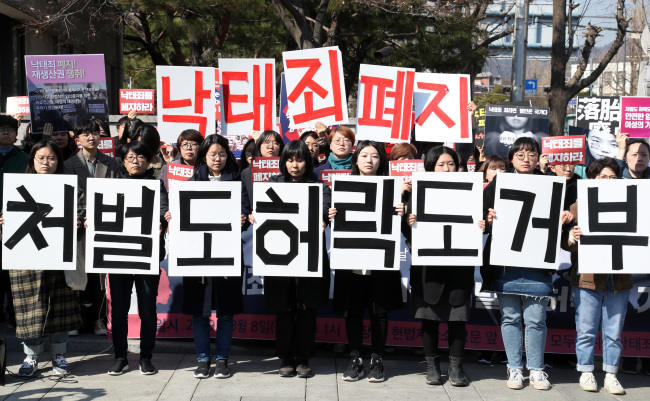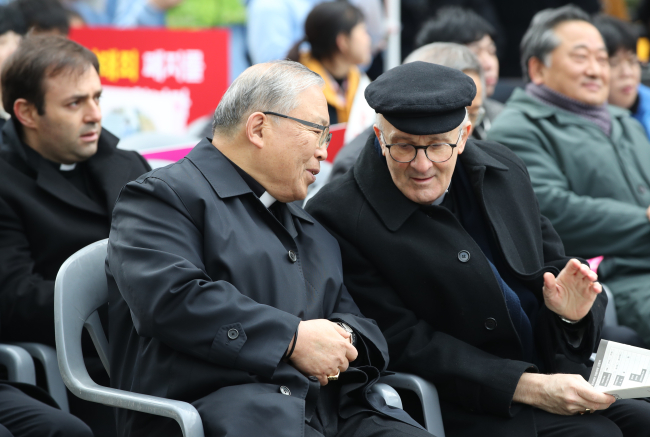March 19, 2019
The decision was made by the country’s National Human Rights Commission.
The National Human Rights Commission of Korea has delivered its opinion to the Constitutional Court that criminal penalties for women who undergo abortion, as well as doctors who perform them, are unconstitutional.
The current law on abortion violates the right to self-determination, among others, the rights panel said Monday.
 |
Marking the first time the rights panel has ever expressed an official position on the highly volatile issue, it sent its statement to the court last week ahead of next month’s ruling on the constitutionality of the nation’s abortion laws.
“Punishing women who undergo abortion based on Article 269 of the Criminal Act infringes on their right to self-determination, right to health, right to life and reproductive rights, among others,” said the National Human Rights Commission of Korea in its statement to the court.
“Criminal penalties for abortion deny the freedom to decide whether to stop pregnancy. They also do not recognize the right to self-determination to make decisions on social and economic issues free from government interference.”
In a democratic country, one should be guaranteed the right to undergo an abortion just as pregnancy cannot be forced at a state level, it added.
With a few exceptions, abortion is illegal in South Korea and women are subject to criminal penalties for undergoing abortion, based on Article 269 of the Criminal Act. Doctors who perform abortions are subject to punishment under Article 270 of the act.
Under the Mother and Child Health Act, abortion is allowed in five circumstances: genetic mental illness on the part of either potential parent; infectious disease; pregnancy resulting from incest and rape; and if the pregnancy endangers the woman’s health.
“Women’s right to health has been severely violated because of abortions performed in the dark, with the number of deaths during the procedure on the rise. If it were legalized, women would be able to receive treatment in a safer environment,” said an official with the Korean Association of Obstetricians and Gynecologists.
Led by gender equality groups and women’s rights activists, there have been increasing calls for the abolition of the criminal law dealing with abortion. They cite basic rights and health risks posed by illegal procedures.
They have also called into question the fairness of the law, which does not impose criminal penalties on the father.
“My body my choice! My life as I wish! Bring in abortion pill,” chanted protesters at the 19th pro-abortion rally organized by BWAVE in central Seoul earlier this month.
BWAVE is a women’s group that advocates legalization of abortion, or as they call it “suspending pregnancy.”
Some 3,000 people joined the rally wearing all-black outfits, urging the Constitutional Court to rule restrictions and punishment of abortion unconstitutional.
“Criminal punishment of abortion denies women the right to make decisions for themselves about what happens to their body, allowing men to step in. This clearly reflects patriarchy that regards women as property belonging to men,” the protesters said.
 |
According to a state-run Korea Institute for Health and Social Affairs survey released last year, some 50,000 abortions were reported in 2017, about one-third the number reported in 2010, which stood at 168,738.
The survey of 10,000 women in the 15-44 age group was conducted online from September to October 2018.
Of the 756 women who said they have had at least one abortion, 33.4 percent said they decided on abortion because carrying the baby to term would hinder their career or studies. Another 32.9 percent cited financial instability, and 32.9 percent said the pregnancy had gone against their family plans.
Depicting a different reality, the Korean Association of Obstetricians and Gynecologists estimates that some 3,000 abortions are performed daily — far more than the official numbers presented by the government.
“Women and doctors involved in abortion are subject to criminal penalties, so it is highly likely they did not answer truthfully in the survey,” said Kim Dong-seok, chief of the association.
While questioning the credibility of the Korea Institute for Health and Social Affairs’ survey, Kim agreed that the number of abortions performed has decreased over the years due to increased awareness of birth control, among other factors.
Among the 36 OECD member nations, 30 countries allow abortion for social and economic reasons, while 25 countries allow abortion at the request of the potential mother.
Meanwhile, religious groups are pushing for a continued ban on abortions, saying the government should protect the lives of the weak and recognize the embryo as a living person.
Last weekend, Alfred Xuereb from the Vatican and Cardinal Andrew Yeom Soo-jung spoke at an anti-abortion rally at Cheonggye Plaza in downtown Seoul.
“Abortion is an act of killing a baby that has just started its life and it is an act of killing maternal instincts that embraces babies with love. We have an obligation to respect and protect small and weak embryos. The country is fully responsible for citizens’ life and safety,” Yeom said.
Suggesting a stricter approach, Bishop Lee Seong-hyo said abortion should also be abolished under the five circumstances when it is permitted under the Mother and Child Health Act.
Earlier this month on International Women’s Day, an alliance in support of the current abortion law formed mainly of protestant groups held a press conference in front of the Constitutional Court demanding the current law to be ruled constitutional.
“If the potential mother’s right to self-determination is prioritized over the embryo’s right to life, it will be no surprise to find rapid increase in the killing of embryos,” they said.
The ban on abortion was challenged in 2017 by an obstetrician-gynecologist surnamed Jung, who had been charged for conducting 69 abortions between November 2013 and July 2015.
In 2012, the Constitutional Court ruled the prohibition of abortion constitutional.
If the court finds criminal penalties against abortion unconstitutional in its ruling slated for next month, the ban would be lifted 66 years after it went into effect in 1953.


